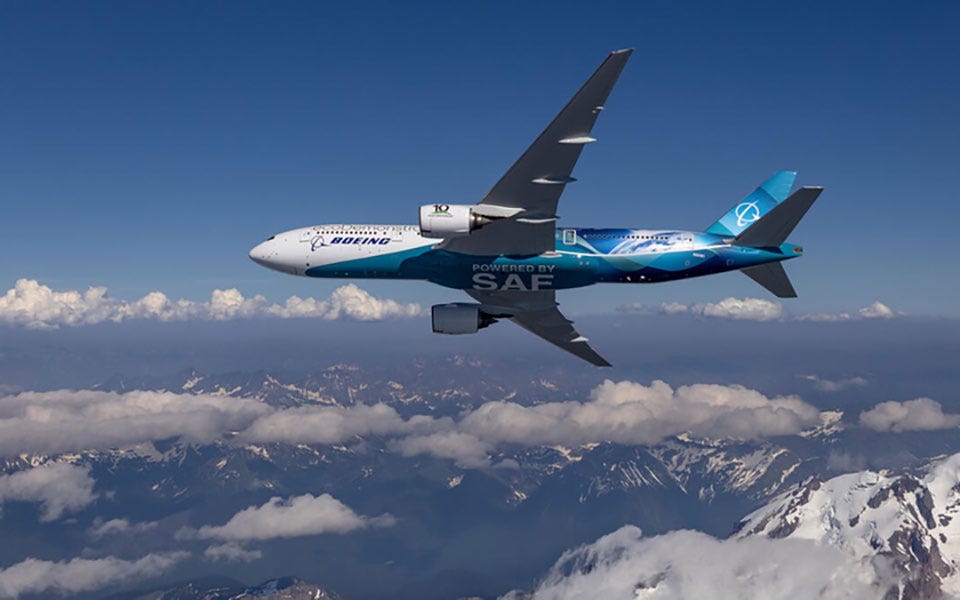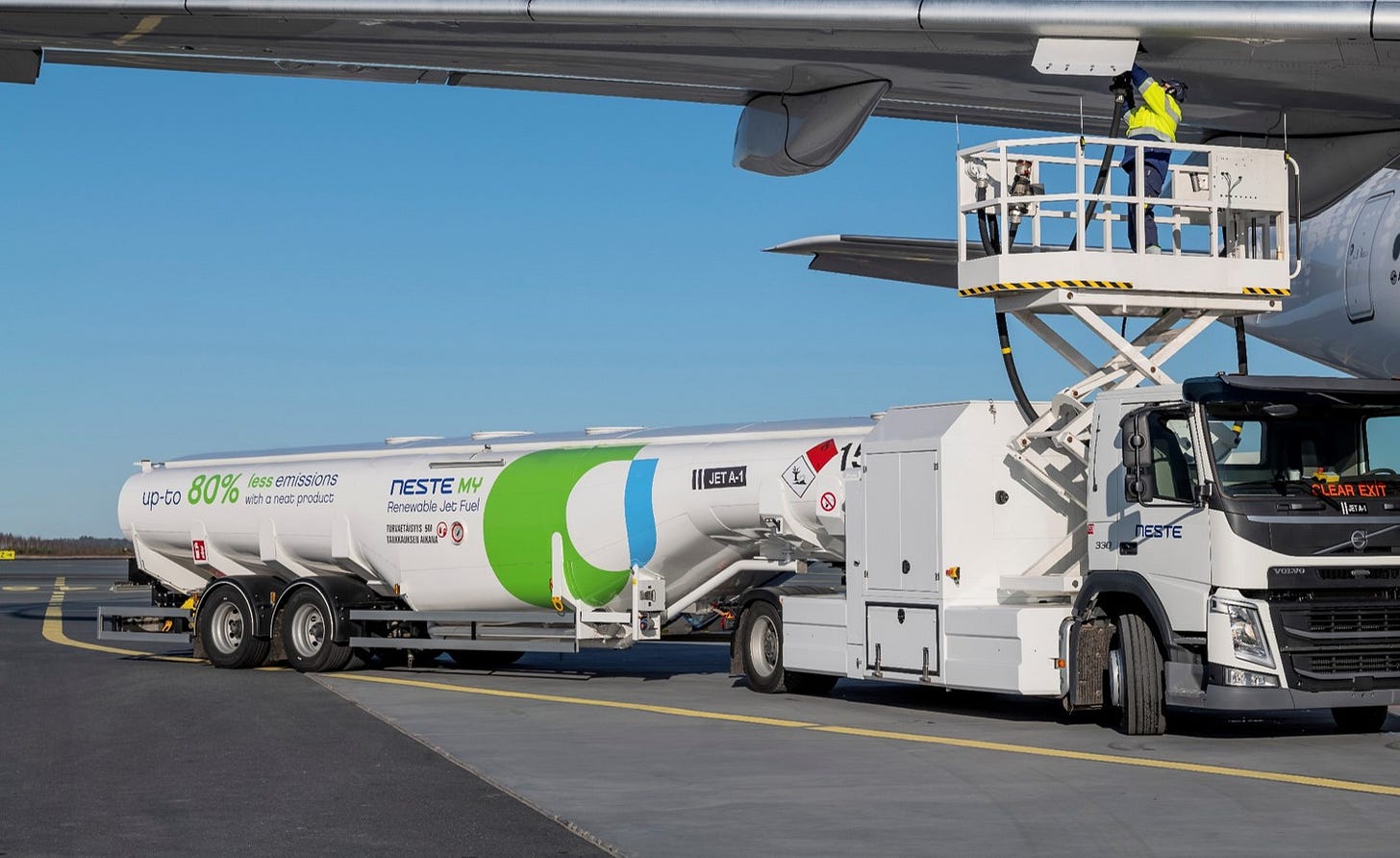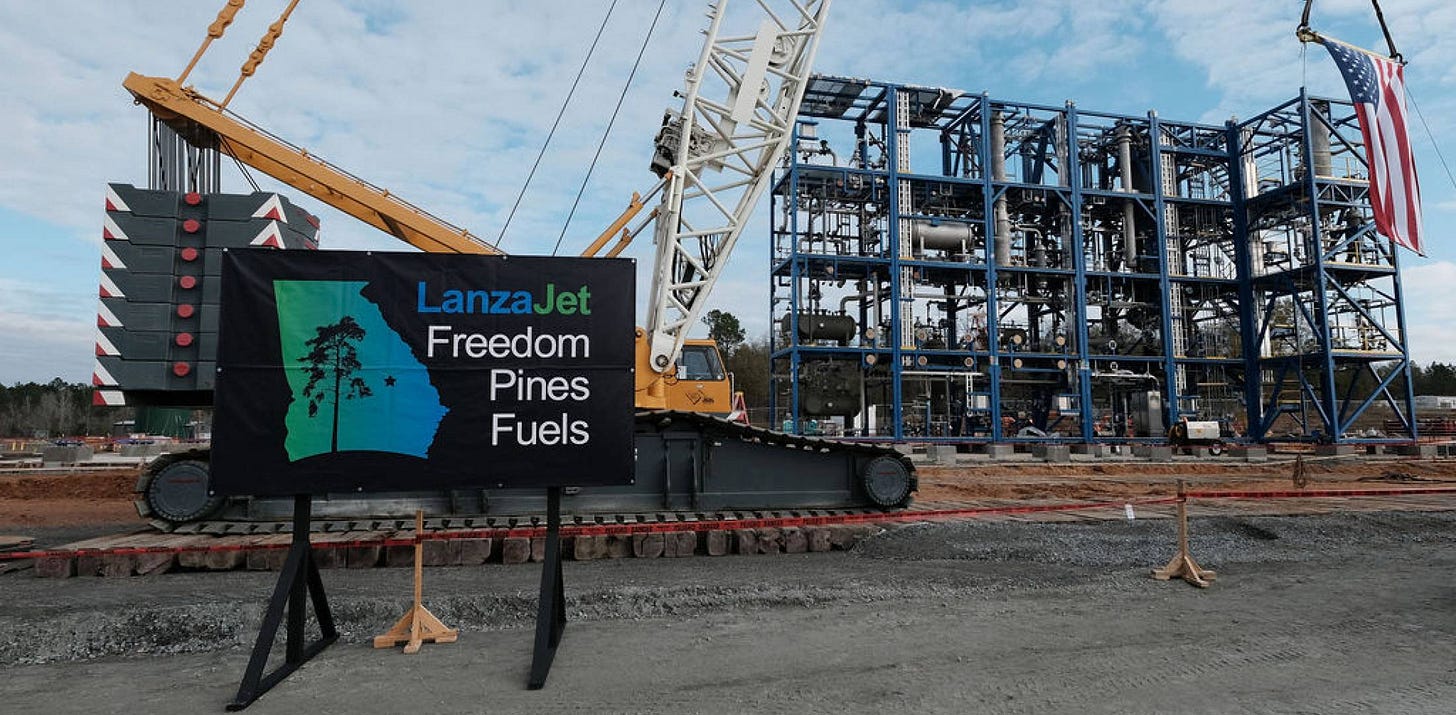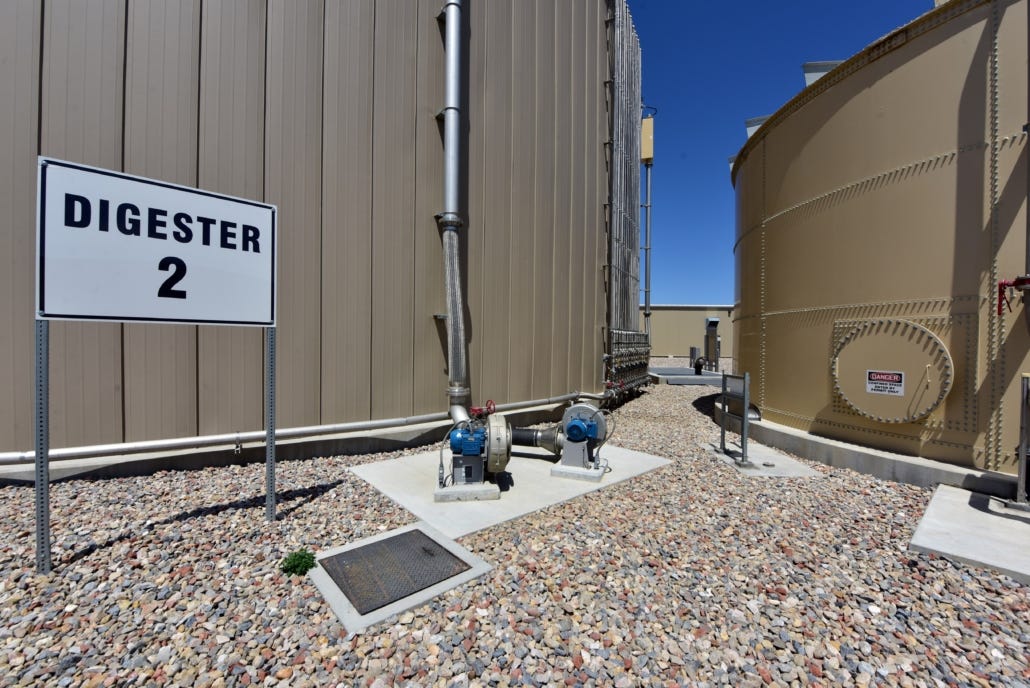5 companies betting on sustainable fuel to make today’s planes significantly more carbon neutral
SAF is the future
Broadly speaking, “sustainable fuel” refers to fuels that can be produced and used without depleting resources or harming the environment. They can come from different renewable sources such as wind, solar, hydro, and bio-based sources, and are a key solution to reducing the negative impacts of traditional fossil fuels.
Many companies around the world are producing sustainable fuels for different use cases, but the most promising of them is probably “Sustainable aviation fuel (SAF),” specifically designed for current planes.
The benefits of SAF are consequent.“Whereas fossil fuels add to the overall level of CO2 by emitting carbon that had been previously locked away, SAF recycles the CO2 which has been absorbed by the biomass used in the feedstock during the course of its life,” the International Air Transport Association (IATA) explains, noting that “SAF can reduce emissions by up to 80% during its full lifecycle.”
And SAF is far from a science fiction concept. The Association, representing about 300 airlines, estimates that more than 50 airlines now have experience with SAF, with “450,000 flights that have taken to the skies using SAF.” Over 300 million liters of SAF were produced in 2022.
Here are some of the most committed companies to eliminating fossil fuel from planes.
1. Boeing
Boeing has been pioneering sustainable fuel for 15 years. Along with Virgin Atlantic and GE Aviation, the manufacturer conducted “the world’s first SAF flight using a commercial aircraft” in 2008. In 2018, the Boeing ecoDemonstrator made the industry's first commercial airplane test flight with 100% SAF in both engines, in partnership with FedEx. In 2021, the company confirmed its commitment to delivering commercial airplanes capable to fly on 100% SAF before 2030.
In February 2023, Boeing announced its decision to purchase 5.6 million gallons (21.2 million liters) of blended sustainable aviation fuel (produced by Neste), more than double the company's SAF procurement from last year. "This SAF procurement makes up 25% of Boeing's total jet fuel needs for last year, and we aim to increase that portion in the years to come,” Boeing said.
2. Airbus
SAF is “a proven alternative fuel for immediate CO2 reduction,” Airbus says, and plenty of successful milestones prove the commitment of the company to make the transition to SAF happening quickly.
In March 2021, an A350 with one of its engines fuelled by 100% SAF took off from Toulouse, France, in “the first in-flight study of its kind using a commercial passenger jet.” Two months later, the same A350 was flying operating both engines on 100% SAF.
March 2022 saw ”The first A380 flight powered by 100% Sustainable Aviation Fuel.” The SAF, produced in France, was made primarily from "used cooking oil and other waste fats.” And in November 2022, the Royal Air Force and Airbus carried out “the world’s first 100% SAF flight using an in-service military aircraft”, which was also the first 100% SAF flight of any aircraft type carried out in UK airspace. The same month, the manufacturer signed a deal with three Chinese airlines to promote the use of sustainable aviation fuel for commercial flights in China.
All Airbus aircraft and helicopters are already capable of flying with up to a 50% blend of SAF today, but “the goal is to enable 100% SAF capability by 2030 for commercial and military aircraft and for helicopters,” Airbus said.
3. Neste
Headquartered in Finland and operating in 14 countries, Neste is considered the world's leading manufacturer of SAF. Its proprietary technology allows the use of almost any waste fat or vegetable oil in the production of sustainable fuel.
As of today, the company produces 100,000 tons of SAF, but its production “will increase to 1.5 million tons (around 1.875 billion liters) annually by the end of 2023.”
The company confirms that SAF reduces greenhouse gas emissions (GHG) but quotes other benefits too. “Because of the lower particulate emissions, the environmental benefits of SAF are actually even more significant than the 80% GHG emission reductions,” it describes.
Nippon Cargo Airlines (NCA), the only international cargo airline based in Japan, confirmed it has started using Neste MY Sustainable Aviation Fuel for several cargo flights in November and December 2022. On the 1st of January 2023, Brussels Airlines received a first delivery of Neste’s SAF and plans to operate its first flight using SAF this year. The same month, Emirates, the world’s largest international airline by destinations, operated its first demonstration flight using Neste’s SAF.
Interestingly, Neste also announced in January 2023 that, from now on, “all diesel-powered ground handling vehicles and machinery at Amsterdam Airport Schiphol in the Netherlands will be using its renewable diesel fuel, produced from 100% renewable raw materials.”
4. Lanzajet
LanzaJet, based in Chicago, was formally spun off from LanzaTech in 2020 but the company started developing and testing sustainable fuels in the 2010s.
Through patented technology, the company creates SAF and renewable diesel from waste-based and sustainable ethanol sources, such as low-carbon sugarcane, energy crops, forest residuals, agricultural wastes, and organic waste.
The company received investments from major industrial partners, such as Suncor, Mitsui, ANA, British Airways, Shell, and Microsoft, and has concluded many commercial agreements in the recent past. In November 2022, British Airways, LanzaJet, and Nova Pangaea Technologies signed an agreement to accelerate Project Speedbird to develop cost-effective sustainable aviation fuel for commercial use in the UK. The project includes the construction of a SAF production facility in North East England, expected to be completed by 2026. The SAF produced there would “reduce CO2 emissions, on a net lifecycle basis, by 230,000 tonnes a year, or the equivalent emissions of approximately 26,000 British Airways domestic flights.” Overall, Project Speedbird has “the potential to reduce CO2 emissions by up to 770,000 tonnes a year.”
Lanzajet is also currently on track to build in Georgia, USA, “Freedom Pines Fuels”, the world’s first ethanol-based alcohol-to-jet sustainable aviation fuel (SAF) production plant,” expected to be fully operational in 2023. The plant will produce 10 million gallons (38 million liters) of SAF and renewable diesel per year, which will “approximately double the amount of current SAF production in the United States.”
5. Raven
Wyoming-based Raven transforms waste – municipal solid waste, organic waste, and methane – into high-quality, clean hydrogen and synthetic fuels, through a purely thermal and chemical reduction process. “Our unique patented technology is based upon non-combustion - producing fewer emissions – and can process multiple and mixed wastes simultaneously,” the company explains.
The process involves heating waste until it is transformed into synthetic gas, followed by the separation of hydrogen from carbon. The excess carbon is sequestered in a usable powder, resulting in a near 100% waste utilization potential.
The reduction of emissions is indeed significant. ”Our synthetic fuels reduce NOx by 16.7%, smoke emissions by 40.3%, hydrocarbons by 49%, carbon monoxide by 33% and particulate-matter by 21%,” Raven underlines.
In December 2022, the company received a €1.7 Million Grant from the European Commission to support a Waste-to-Hydrogen production facility in Spain, expected for 2024. In January 2023, Raven signed deals with Japan Airlines and All Nippon Airways to supply Sustainable Aviation Fuel, with a commitment to support a 10-year supply. The agreement involves “an initial 50,000 tons of SAF supply in the first year, 2025, with annual incremental increases to 200,000 tons for year 10.”
Worth mentioning too
If sustainable aviation fuel is key to reaching a net-zero future, progress is also made on other forms of fuel for other uses.
In Utah, USA, the Wasatch Resource Recovery facility has implemented a process to divert organic waste from the landfill, and demonstrate that we can produce biogas from organic trash with significant environmental benefits
The waste is collected from businesses, then transported to the facility and processed by a series of machines to remove any contaminants or non-food material. The organic material is ground up and then heated to aid the growth of microbes which break down the organic matter and produce biogas. The biogas is purified and converted into biomethane (renewable natural gas) and sold into the market as renewable “green” power. The remaining product is a nutrient-rich, carbon-based fertilizer used to grow crops.
This process has already diverted close to one billion pounds (440,000 tonnes) of food waste from the landfill, allowing the heating of 724,000 homes for a day.
Elsewhere, Nevada-based Select Fuel uses advanced technology to convert plastic waste into a valuable petrochemical by-product. “At least 75% of plastic waste can be converted into multiple bioenergy products,” the company says, explaining that it can produce different forms of fuel, at scale, able to power any Internal Combustion Engine (ICE). Select Fuel’s solution allows to produce four types of Renewable Fuel: renewable aviation fuel (SAF), renewable vehicle fuel (for racing or passenger cars), diesel, and condensate (used to dilute highly viscous oils).
In December 2022, Select Fuel established a partnership with Italian iconic luxury brand Bertone, to supply renewable fuel for its newly launched BG110 sports car, presented as “the world’s first hypercar running on fuel made from plastic waste.”
The bottom line
Promoting the use of sustainable fuels is crucial to mitigating the impacts of climate change and ensuring a sustainable energy future.
The good news is that sustainable fuel is a reality — right now. The fact that we can fly a typical long-haul plane with used cooking oil is not a small feat. Using SAF, it is possible to reduce planers’ emissions by up to 80%, without a complete transformation of today’s aircraft design.
SAF production is boosted by several national policies and state initiatives (like the Sustainable Aviation Fuel Grand Challenge in the U.S., launched in 2021 to expand the production and use of SAF, reinforced in 2022 by possible additional tax incentives). But SAF production needs to scale up quickly to make its impact real, according to a detailed study by Rhodium Group (December 2022). “Industry stakeholders and policymakers alike understand the vital role SAF could play in decarbonizing US aviation,” the report reads, “but more must be done to overcome the existing supply-side and demand-side hurdles, which greatly inhibit the scaling of SAF.”
Still, actual progress is being made, allowing us to be optimistic about the capacity of the air transport industry to reduce the global carbon and environmental impact of air transport. Until the mid-2030s, when other solutions (such as hydrogen-powered planes) could emerge, SAF should be a key solution to make planes effectively greener.










